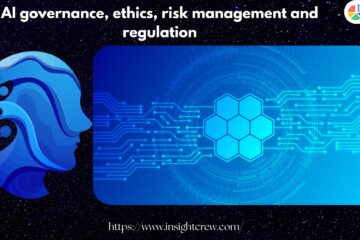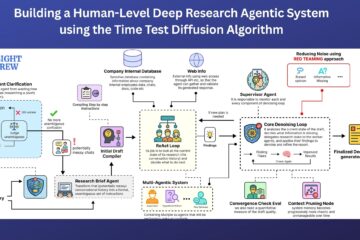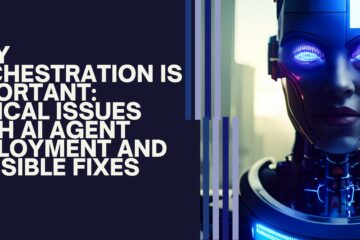AI is transforming how companies handle their client relationships. Artificial intelligence is now used by CRM systems to help businesses better understand and serve their customers. These intelligent tools are capable of task automation, data analysis, and customer need prediction.
CRMs with AI capabilities can help businesses save time, increase sales, and enhance customer service. They can identify patterns in consumer behaviour, make tailored offers, and even respond to standard questions from clients. This enables sales teams to concentrate on establishing more solid connections and completing transactions.
CRMs are growing in strength as AI technology advances. They can now provide advanced forecasting, voice-to-text transcriptions, and real-time insights. This enables companies to stay ahead of the competition and make more informed decisions.
Important Takeaways
- By automating processes and offering insightful data about customers, AI improves CRM systems.
- Sales, customer support, and overall business efficiency can all be enhanced by intelligent CRM systems.
- CRM capabilities continue to grow and change as AI technology develops.
The Convergence of AI and CRM
CRM and AI are combining to change how companies communicate with their clients. Better insights and more intelligent tools are provided by this combination to enhance client relationships.
What AI-CRM Is
Customer relationship management and artificial intelligence are combined in AI-CRM. It improves the functionality of CRM systems with smart technology. AI-CRM is able to identify data patterns that humans might overlook. This gives companies a deeper understanding of their clients.
Numerous tasks can be performed automatically by AI tools in CRM. They can chat with customers, sort leads, and forecast sales. These systems make educated guesses about future customer needs based on historical data.
Customising customer experiences is another benefit of AI-CRM. It can recommend the ideal times to get in touch with someone or suggest items they might find appealing.
History and Development
Since the 1980s, CRM systems have been in use. Initially, they were just basic databases used to hold client data. They became more sophisticated and practical over time.
In the early 2000s, AI made its debut in the CRM space. It was simple at first. Simple tasks like email sorting could be performed by AI. AI took on more complex tasks in CRM as it became more intelligent.
AI-CRM systems nowadays can forecast consumer behaviour. Over time, they improve through machine learning. Tasks that previously required human thought can now be completed by these systems.
AI in CRM has rapidly expanded. AI is now viewed by many companies as essential to their CRM plans. It enables them to better serve clients and maintain their competitiveness.
Improving Communication with Customers
AI is transforming the way companies interact with their clientele. It aids businesses in better understanding and interacting with people. Stronger bonds and happier customers are the results of this.
AI-Assisted Interaction
AI is now used by chatbots to communicate with consumers, and many businesses use live chat outsourcing to guarantee 24/7 assistance while maximising resources. They are available to respond to enquiries day or night. This eliminates the need for clients to wait for assistance.
Chatbots can comprehend human speech thanks to natural language processing. They can decipher the meaning of words. They are better able to respond as a result.
Previous conversations teach chatbots. They become more intelligent with time. As a result, they will be able to tackle increasingly challenging enquiries.
AI benefits human workers as well. It may offer solutions or next actions. Customer service becomes more accurate and faster as a result.
Instantaneous Perspectives
AI evaluates consumer data fast. It recognises patterns that people might overlook. This aids businesses in comprehending what clients desire.
Businesses can immediately see how customers feel. AI systems look at customer reviews and social media. This enables companies to quickly resolve issues.
AI forecasts a customer’s future needs. It examines both recent and historical patterns. This aids businesses in providing the appropriate goods or services.
Every interaction is made more personalised with real-time insights. Based on a customer’s past purchases and preferences, a business can modify its strategy.
Customers feel appreciated because of this personal touch. More sales and devoted clients may result from it.
AI in Marketing and Sales
AI tools improve marketing and sales. They facilitate more efficient teamwork and improved customer outreach.
Pipelines and Sales Forecasting
AI improves the accuracy of sales forecasts. It examines historical data and market patterns. This aids in the planning of sales teams. They can concentrate on the most promising deals.
Sales pipelines are also managed by AI. At every stage, it keeps track of leads and deals. Risks are highlighted by the system, which also recommends actions. This keeps transactions going.
Salespeople receive notifications about which leads should be called first. AI rates leads according to their likelihood of making a purchase. This increases success rates and saves time.
Marketing Campaigns Driven by AI
AI develops focused advertising campaigns. It looks for trends in consumer data. This makes sure the right person receives the right message.
24/7, chatbots converse with website visitors. They assist users and respond to enquiries. This allows human employees to work on more complex tasks.
Email subject lines created by AI receive more opens. To find the most effective version, it tests several iterations. Emails that people want to read can then be sent by marketers
Platforms for CRM and AI Software.
AI is transforming CRM software use in businesses. Smart tools help businesses better understand their customers and make more informed decisions.
Examining Leading CRM Products
Salesforce’s Einstein AI puts it at the forefront. This tool identifies trends and forecasts sales results. HubSpot CRM provides free AI tools to assist with content creation and email writing. AI is used by Zoho CRM to identify the best leads and predict sales. Similar features are provided by Creatio CRM with AI, which aids companies in streamlining processes, forecasting consumer behaviour, and providing individualised experiences. Sales teams can work smarter, not harder, thanks to these platforms.
CRM AI can:
- Data entry should be automated.
- Forecast consumer behaviour
- Make recommendations for the best course of action next.
- Customise interactions with customers
Tailoring AI Features to Meet Requirements
AI tools in CRMs can be customised by businesses to meet their objectives. Some concentrate on chatbots driven by AI to provide prompt customer service. Others score leads and identify the most promising sales opportunities using AI. Selecting features that address actual business issues is crucial.
For instance:
- AI could be used by a retailer to forecast what goods customers will purchase next.
- AI could be used by a B2B company to determine which leads have the highest chance of becoming clients.
- AI could be used by a service provider to identify clients who are likely to leave.
- Businesses can increase sales and maintain customer satisfaction by selecting the appropriate AI tools.
AI and CRM Integration for Revenue Growth
CRMs with AI capabilities increase revenue and strengthen client connections. They help businesses increase revenue by automating tasks and providing data-driven insights.
Methods for Increasing Revenue
CRM systems with AI enable sales teams to operate more efficiently. Which leads are most likely to make a purchase can be predicted by it. Reps can now concentrate on high-value prospects. AI also recommends the ideal times to reach out to clients. It can even create customised email drafts.
Some AI tools look for opportunities for upselling by analysing customer data. They mark accounts that are prepared for updates or new goods. AI chatbots answer simple enquiries, freeing up salespeople to work on more complex pitches.
AI-powered CRMs are able to generate personalised sales projections. These assist groups in modifying their tactics and establishing reasonable goals. They also provide real-time pipeline health tracking.
Performance and Growth Metrics
CRMs with AI enhancements provide more in-depth information about sales performance. They monitor important metrics like deal velocity and conversion rates. Managers can see why deals are won or lost and which representatives require assistance.
These systems provide more precise customer lifetime value measurements. They offer strategies to maintain client satisfaction and forecast churn risk. Marketing campaign success can also be measured by AI tools.
AI is used by some CRMs to score leads according to their actions. This aids teams in setting outreach as a top priority. To determine the most effective ways to reach customers, they also monitor engagement across channels.
AI dashboards make it simple to identify patterns and take quick action. They create understandable charts and alerts from complicated data.
Developing Robust Client Relationships
AI improves consumer interactions across all channels. It looks at past conversations to recommend tailored messages for every customer.
Sales teams can find high-value prospects with the aid of predictive analytics. Accounts that are at risk of churning can be flagged by the system, enabling early intervention.
Sentiment analysis driven by AI analyses call and email transcripts to determine customer satisfaction. This enables businesses to enhance service quality and promptly resolve problems.
Automated follow-ups guarantee that no client is overlooked. Birthdays, contract renewals, and product upgrades can all be promptly reminded by the system.
CRMs are transformed into more than just databases by utilising AI. They become tactical instruments for cultivating enduring, solid client relationships.
Developing Robust Client Relationships
AI improves consumer interactions across all channels. It looks at past conversations to recommend tailored messages for every customer.
Sales teams can find high-value prospects with the aid of predictive analytics. Accounts that are at risk of churning can be flagged by the system, enabling early intervention.
Sentiment analysis driven by AI analyses call and email transcripts to determine customer satisfaction. This enables businesses to enhance service quality and promptly resolve problems.
Automated follow-ups guarantee that no client is overlooked. Birthdays, contract renewals, and product upgrades can all be promptly reminded by the system.
CRMs are transformed into more than just databases by utilising AI. They become tactical instruments for cultivating enduring, solid client relationships.


